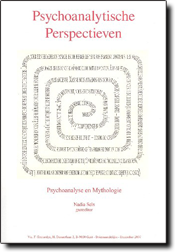Vol 27 (1/2) 2009
Lacan, Alcibiades and Freud: On Love and Transference – Paul Moyaert
Mè Funai: like father, like daughter? Tragic footnotes to the mythic desire of death. – Dieter de Grave
Cain and Abel: The Prodigal Sons of Psychoanalysis? – Jens De Vleminck
The scandalous myth: Psychoanalysis as critical methodology in Barthes’s Mythologies – Maarten de Pourcq
“Who’s afraid of the Big Bad Wolf?” The fairy tale on the couch – Stijn Praet
Myth, hunt and sublimation. The Gestaltwandel of the goddess Artemis and the hunter Orion interpreted from a psychoanalytical perspective – Jeroen Lauwers
Myth, hunt and sublimation. The Gestaltwandel of the goddess Artemis and the hunter Orion interpreted from a psychoanalytical perspective
This paper tries to demonstrate that psychoanalysis can not only distill fixed and unchangeable meanings from a myth, but that it can also throw light on the dynamic forces that modify myths such that they can function in the society in which they are communicated. A...
“Who’s afraid of the Big Bad Wolf?” The fairy tale on the couch
Ever since its very beginning, psychoanalysis has allowed itself to be inspired by knowledge supposedly present in (pre)literary genres like myths and fairy tales. However, with time, the tables were turned and its theories were systematically and rigorously applied...
The scandalous myth: Psychoanalysis as critical methodology in Barthes’s Mythologies
In Roland Barthes’s Mythologies (1957), psychoanalysis is deployed as a critical method to analyze the use of signs in contemporary mass culture in France. Barthes claims that society is permeated by petty bourgeois myths representing phenomena which are basically...
Cain and Abel: The Prodigal Sons of Psychoanalysis?
It is widely known that Freud gives Oedipus a central place in both his psychoanalytic theory and praxis. Freud introduces the Oedipus myth as the crucial key for understanding the tragedy of human life. One of the most problematic issues innate to the human condition...
Mè Funai : like father, like daughter? Tragic footnotes to the mythic desire of death.
Human sexuality manifests itself in the unfolding of an opposition between universal procreation and individual enjoyment. In this opposition the author detects the knotting of two drives in an apparent juxtaposition: Eros and death drive. On the basis of the three...
Lacan, Alcibiades and Freud: On Love and Transference
This essay examines why Socrates uses the Symposium of Plato to better understand transference in psychoanalytic treatment. The reason is found in Freud's argument that transference is true love and that Eros is the subject of the Symposium. Can Socrates be seen as a...
